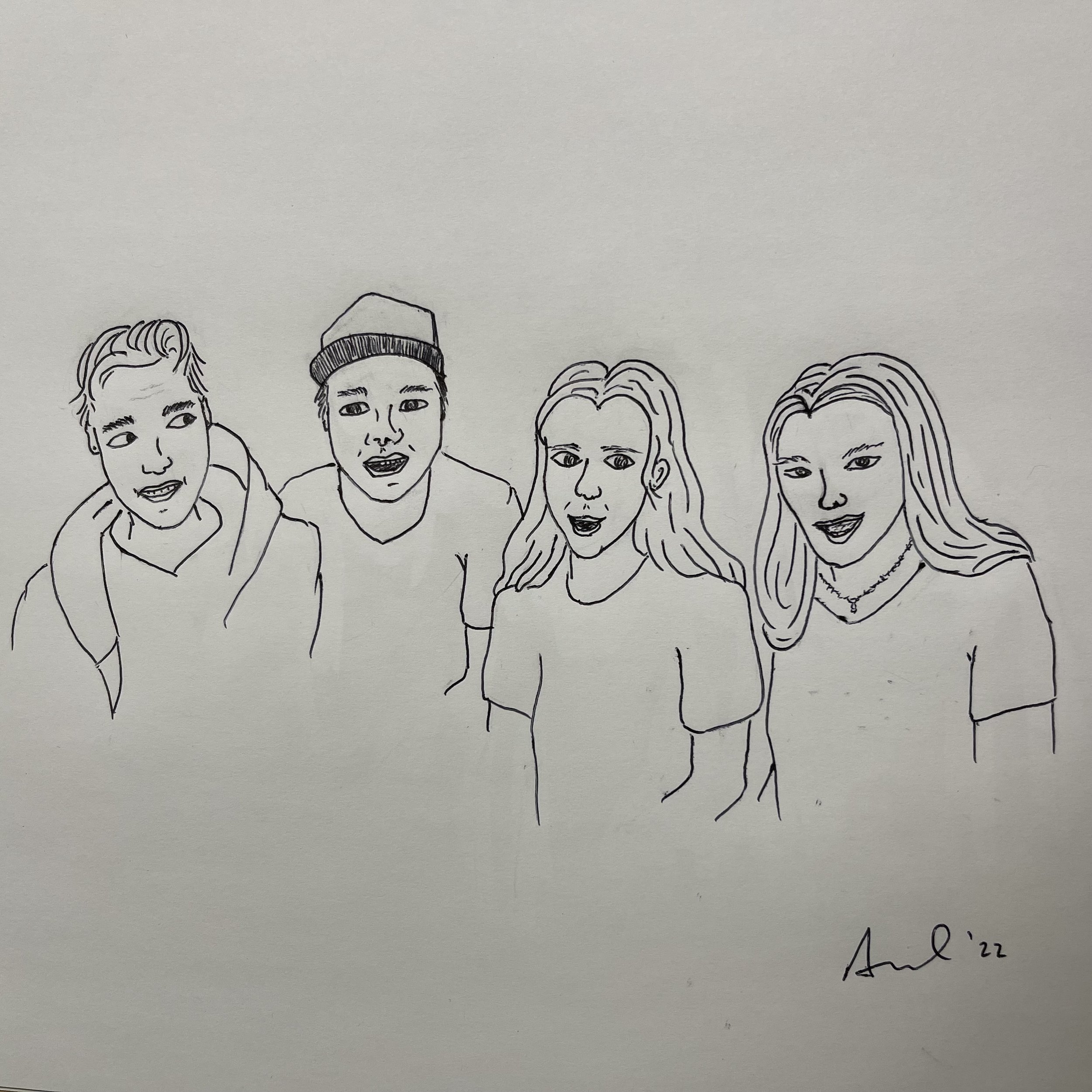Teenagers: A Case Study
Drawing by Andrew Gillespie
BY JESIKA FEATHER
We are four teenagers deep in this household. Even way back, when I was pushing a double stroller with all four of them crammed in, I had trepidation for this time. Finally, I'm peering out from the thick of it. It's a relief, actually. Living the teenpocalypse, versus waiting all those years in suspense. I thought the house might fall down. But so far, everything is intact.
There are ten of us here. Four teenagers. Four parents. Two devoted housemates.
On Boundaries
Teens have biologically evolved to push our boundaries. Obviously, over thousands of years, the teens who feigned ignorance regarding solid household norms were the ones who survived plagues and famines. Because now, when you enforce a rule (the same, exact rule that's been in effect since they were sticking LEGOs up their nostril and peeing in the sandbox) they look at you like you're saying red-means-go and green-means-stop.
I wish I could read the following two paragraphs to you over a film montage of their confused and aghast facial expressions. That would get my point across perfectly.
No, you can't eat caramel apples in your bed. No, you can't stand off to the side of the dinner table and stare patronizingly at us soup-eaters, while you consume Lime Jalapeno Ruffles out of the bag.
No, I'm not buying you a $450 leather briefcase to use instead of a backpack. And, also, no you can't have one of those backpacks you saw in a YouTube commercial with hydraulics that “glide” up and down as you walk - to reduce the impact on your shoulders. How old are you? 87?
Sometimes they do this on purpose, to wear me down. And then, strategically, they throw in the thing they REALLY want after I’ve hit prime decision fatigue.
They hear a note of weakness . . . indecision . . . in my decree: “You probably shouldn’t let the bird perch on your head while you bake cookies.” That’s when they go in for the kill.
My fortitude abates. I hear a voice in the distance . . . is that my voice? It's saying something like, “FINE, go ahead. Play Fortnite. Just finish your homework in the morning before school. No problem.”
Inevitably, I come to my senses. But the words have already been spoken. And I try not to go back and forth with my proclamations because that's confusing. I just have to do better next time.
On Getting Them to Talk
I read somewhere that a majority of parents only spend eight-minutes-a-day in conversation with their teens. This gave me pause to evaluate my daily interactions.
It’s not hard to see how this eight-minute-tragedy can occur. When we parents attempt “normal conversation,” teenagers often give sub par responses:
“What did you do today?”
“School.”
“But what happened at school?”
“Classes.”
“Seriously? Tell me something!”
They look at me and . . . was that a growl? The top lip is curled into a snarl and I can hear a low vibration emanating. This is accompanied by sustained, severe, eye contact.
Pre-snarl, all eye contact was utterly denied. But now we have entered the wolf zone, and they are establishing dominance.
If you act on instinct (which I usually do) there are two clear responses to the wolf zone.
You can stare them down while saying “I cleaned your diarrhea off the checkout counter at the Goodwill when you were one-and-a-half, and you still complain when you have to scrub your own egg pan, so you are NOT the Alpha in this room.”
Or . . .
You can laugh at them.
But I'll tell you right now, neither of these options is gonna work.
It turns out there is another option. I'm learning about it from the three other adults who parent my children with me. The lesson I'm learning is called: The Ignore.
This involves ever-so-slightly toning down your inquisition, while still expressing genuine interest in your teenager's day. Don't drop your eyes in submission, but also don't engage in the stare-down. Switch from your original essay question to a short answer. Avoid yes/no questions at all costs. Ask something like, “What did you have for lunch?” Or “What’s the sketchiest bathroom graffiti you’ve seen so far?”
This actually seems to work. And if you can get your teenager talking, you're ultimately winning. Because once the conversation gets going, they might volunteer information on their own.
On Being In Public
It was the first Friday night of high school for our two freshmen, and there was an ice cream social followed by a football game.
Some of my kids are totally chill with these events. A couple of my teens still hold my hand in public and hug me goodbye in front of their friends. But my other kids are the total opposite. For them it's a solid no-family-affection-in-public.
These kids are terrified that the rest of us will enact some hardcore social taboos. Like walking . . . talking . . . or eating ice cream.
I assure them that I'm gonna be hyper vigilant. I'm gonna call a moratorium on any embarrassing activity. The problem is that everything embarrasses them. So I was a tiny-bit faking that declaration.
Upon arrival, we saw that volunteers were opening box after box of packaged ice cream bars and scattering them across a table. Obtaining an ice cream at this event was very casual and required zero human interaction.
Two of my kids walked right up and grabbed their ice cream. The other two stood back and observed . . . I guess to figure out which ice cream was the most socially acceptable to select?
“Don't you want some ice cream?” I asked.
“I DON'T KNOW, OKAY?”
I'm not sure what kind of study they were doing, but after about ten minutes of careful observation and social calculation, they eventually settled upon a Drumstick.
One of my partners and I decided to go talk to the principal.
Yes, I was obviously breaking the embarrassment contract I'd made with my kid, but this was why I came to the event. I'd never met a single adult at this school. I needed to get a vibe.
My socially chill kids were already hanging at a big table full of friends. Mainly new friends. Like they probably just met them at that moment.
My socially anxious children were orbiting. Their excruciatingly slow rotation got smaller and smaller. It was like a spiral with us two parents and the school administrators at the center. I could tell they desperately wanted to know what we were talking about. Maybe they worried we were describing their potty training process or something equally embarrassing . . . like, what grade they are in.
Finally my kids came close enough for me to introduce them. We'd already told the principal we had four kids. Two in middle school, elsewhere, and two who'd just started here, at the high school.
“Are you one of the middle schoolers?” the principal asked.
“Yes! I mean, no! I mean . . . It's hard to remember sometimes,” says my kid.
Wow.
Suspecting that our very presence was causing distress, our parent group decided to move along. “We are gonna leave you high schoolers to attend the football game on your own.”
“You’re leaving?” our kid asked, not sounding nearly as relieved as I'd expected.
“Yes. Then you won't have to worry about us embarrassing you.”
“But I don't want you to go.”
Their dad reached out for a casual side-hug. “You're gonna be . . . ”
“NO PHYSICAL AFFECTION!”
Instant recoil. “You'll obviously be able to relax more if we head out.”
“I don't think so!”
Suddenly it became clear. They wanted us there, but . . . like . . . a stone's throw away. No touching. No eye contact. No outward acknowledgment of association.
Just there.
On Enduring Their Expert Opinion
When your teenager dispenses their expertise on topics you know far better than they do, it's not as cute as when they were little.
When they were little, they marched up to you after school with their rolled up painting sticking out the side pocket of their backpack. They tilted their head up, and you saw wonder and vibrancy in their eyes. “Mom! Did you know that the purpose of a turtle's shell is protection and camouflage?”
And you’d say, “That’s so cool! You've been teaching me so many amazing things since you've started school!”
But now it's different. They come home saying “Mom, there's this kind of binder that everyone has, and I need it. It's the only logistical way to organize my stuff.”
And you're like, “We already have a whole box of three ring binders. A potpourri of sizes. We don't need to buy anything.”
They sigh. They look at you with exasperation and (gag) pity.
“Mom. We're in high school. You're gonna have to get with the times. Binders have changed. This kind holds a folder for every class, it folds shut so that everything doesn't fall out. And there's a built-in clipboard on the inside.”
The room reeks of condescension.
You know from the feeling swelling deep inside, that it's time to employ The Ignore. You close your eyes and try to summon that old feeling from times past, when they told you about the turtle. And when they told you that blue and red make purple.
But you can't. You just can't.
“Get with the TIMES????”
In order to brandish maximum authority, you stand up, knocking the pile of towels you were folding off the couch.
“You are talking to me about a Trapper Keeper. Which became popular in the 1980s. I have owned three of them, personally. One with a rainbow, one with bubbles, and one with a gorilla. I have no problem getting you a Trapper Keeper, for nostalgic reasons if nothing else, but STOP TALKING TO ME LIKE THAT!!!!”
On How We Muddle Through
We laugh at their dirty jokes, their awkward stories, their cringey interactions. We help them make it funny because if you can’t make it funny you’re done for.
Then we make them go to bed.
They remind us that they are too old for “bedtime” and I don’t care.
“This is for your own survival” I tell them. “I am not nice after 9:00 p.m.”
Nine o’clock is when I make life funny for myself, with my co-parents or over a text message with my friend. While drinking a cocktail. Or eating ice cream. Or doing whatever thirty minutes of debauchery I can get into before I pass out. Thirty delectable minutes to convince myself that there is anything good in this entire world about being a grown up.
So that tomorrow I can get up and be there again. Not too much. Not too little. I am the Goldilocks of being there. A stone's throw away. No touching. No eye contact. No outward acknowledgment of association.
Just there.
JESIKA FEATHER lives with her family of eight (including four adolescents) in a small, intentional community in Eugene, OR. She is a writer and a substitute teacher. With a tempestuous brood of teenagers forging their diverse paths toward adulthood, her family dynamic (currently) feels ever-changing. She manages this uncertainty by conversing with herself on long walks up steep hills. She uses writing to find novelty in the mundane, and humor in the sadness. She’s also just a compulsive over-communicator. She generally writes about parenting, family, and beautiful-yet-quirky social interactions. Her writing can be found in Communities Magazine and on her blog: jesmamasmusings.blogspot.com.


